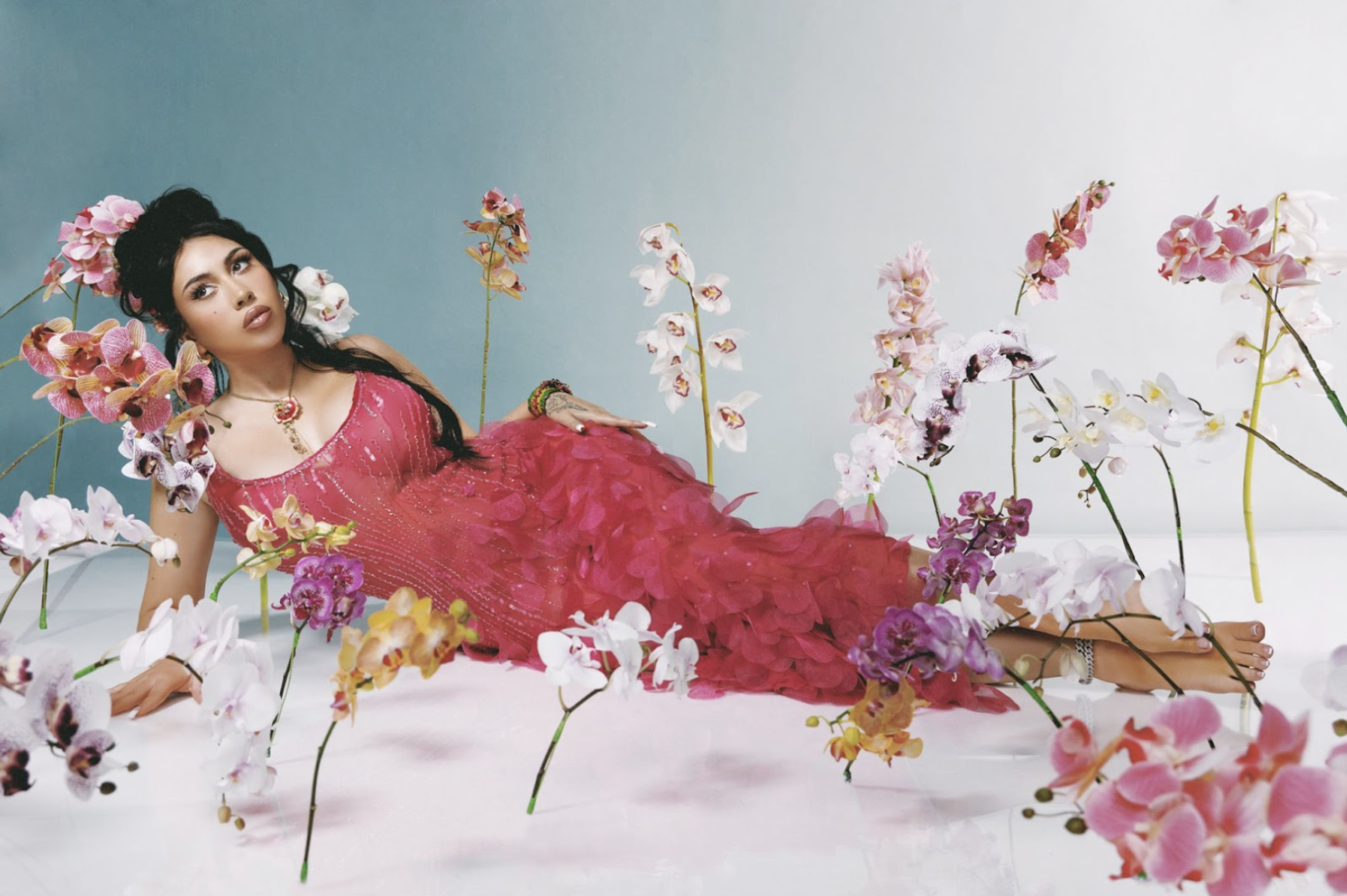Timeless; eerie; mystic; striking; graceful; sensual: Kali Uchis’s descriptors of the orchid, national flower of Colombia and namesake of her fourth studio album ORQUÍDEAS (2024), could not encapsulate her own music more perfectly. Her second Spanish-language record, which she created simultaneously with the English-language Red Moon in Venus (2023), boldly incorporates modern and traditional Latin influences into her sultry, sumptuous, high-femme sound. ORQUÍDEAS is an exercise in experimentation, allowing Uchis to flex her vocal and sonic dynamism; even so, she never loses sight of the divinely feminine quality that’s always defined her music, giving her fans old and new Kali in equal measure.
While Red Moon fit into Uchis’s pop/R&B-leaning discography seamlessly, ORQUÍDEAS sees Uchis dip her toes into a vast array of Latin genres like bolero (“Te Mata”), merengue (“Dame Beso // Muévete”), dembow (“Muñekita”), and reggaetón (“Labios Mordidos”). The album’s stacked cast of features alone hints at its broad soundscape: Red Moon boasted R&B heavyweights like Summer Walker and Don Toliver, whereas ORQUÍDEAS runs the gamut from “King of Modern Reggaetón” Rauw Alejandro to corrido/hip-hop youngin Peso Pluma to City Girls’s JT. Each featured artist adds layers to the Latin-R&B blend that Uchis has perfected, imbibing her dreamy vibe-forward sound with new blood.
As always, Uchis effortlessly ushers her music into the contemporary cultural zeitgeist. With 2023 being dubbed “Year of the Doll” thanks to films like Barbie and Poor Things, ORQUÍDEAS’s lead single “Muñekita” puts a sexy spin on the trend. Plasticky synths and lively drums evoke the Jamaican riddims that underlie Dominican dembow, adapting Uchis’s maximalist production techniques to suit the genre. Her lustrous voice sings the addictive refrain, “Dale gata, dale muñequita,” along with coaxing lyrics like “Tu angelita es lo que necesitas … Sabes quién soy, la que tú necesitas.” Right in the first verse, Dominican rapper El Alfa—“The King of Dembow”—exhibits his command of the genre in the sonic world Uchis modeled after his music. The backtrack’s pace follows his bars, falling into humble submission before the King; but just as easily, it goes into full throttle to gas up JT, ending the song on a rush of pure adrenaline. Bridging the gap between old-school dembow and new-school rap, “Muñekita” pays its dues to the groundbreakers of Latin music in a mainstream pop medium. Uchis enlists another up-and-comer, Mexican corrido singer Peso Pluma, on the upbeat “Igual Que Un Ángel,” a similar homage to traditional Latin styles in the contemporary music landscape. Pluma’s textured, velvety rasp pairs beautifully with Uchis’s silken smoothness, marrying their distinct sounds in unexpected harmony.
Uchis certainly packed ORQUÍDEAS with even more pop hits than Red Moon, but she still gives herself space to luxuriate in melodrama. On the bolero-inspired “Te Mata,” she subverts the Cuban genre’s poetic expression of love and loss to unshackle herself from a toxic partner. Although she’s “la diabla” in her lover’s story, she says, she’s one who “pa‘ volar me tocaría encontrar mis propias alas,” using biblical imagery to illuminate the divine quality of her empowered femininity. The music itself has a mythic, mischievous quality, with a plucky acoustic guitar, gradually building strings, and a delicately arpeggiated percussive line. Uchis’s low, syrupy vocal invokes a nightclub songstress’s crooning—a one-eighty from her typical twittering that floats above the notes supporting her. At the chorus, though, the melody crescendoes as she breaks into a liberated belt to declare, “Por fin me di cuenta que me merezco mucho más / Y eso te mata.”
While flaunting her immense knowledge of the Latin music canon, Uchis satiates her longtime fans with some of her already beloved sound. The dark, almost dystopian intro to “Pensamientos Intrusivos” obfuscates what the rest of the song holds: a flirtatious hymn with seductively sweet vocals enticing her partner to silence the thoughts taunting her “Hoy, ayer, ahorita, y mañana.” By contrast, whimsy and lightness color the buoyant “Young Rich & In Love,” a slam-dunk Uchis hit with her signature warbling and glimmering production effects that highlight the track’s straightforward declaration of desire.
Uchis channels her passion into vulnerability on “Tú Corazón Es Mío,” reassuring her loved one that she’s in for the long haul. The music video for the track reaffirms the security of the relationship in an ode to her partner, rapper Don Toliver, combining their childhood home videos with newer footage of their domestic life together as they await the birth of their first child. The second half of the video transitions into the briskly paced “Diosa,” aptly named to reflect its main throughline: the godliness of femininity. Residing on a magenta-hued planet, Uchis dons a white dress with the stomach cut out and draped with glass beads to accentuate her pregnancy, tying together concurrent themes of family and femininity in both parts of the video. Motifs of flowers—specifically orchids—waves crashing, and the sun and moon cycling visualize the celestial sounds of her music and the sanctity of women’s bodies.
Shades of pink color Uchis’s female-forward discography at large; the fuschia-tinted reggaetón track “Labios Mordidos” with Colombian superstar KAROL G is an anthemic tribute to women across Latin America, replete with lines of flattery like “Esta noche soy lesbiana / Tú me das las ganas.” Uchis and KAROL G also liken themselves to “Una muñequita de una peli de Tarantino,” highlighting features like strawberry lip gloss and skin “de miel y coco” to paint a vivid picture of desire. A similarly vibrant reggaetón track, “No Hay Ley Parte 2” with Rauw Alejandro reinvents Uchis’s 2022 hit of the same name. Alejandro’s beat-driven flow and an added layer of electro-trap distortion complement Uchis’s featherweight vocals on her mesmerizing verses and earworm of a chorus: “All I hear is, ‘La-da-di-da-da-do!’” It’s a bit disappointing to hear a remix of a single as part of a brand new album, but as a standalone, “Parte 2” embodies Uchis’s artistic evolution by updating one of her more popular tracks.
In a final display of her versatility, Uchis closes ORQUÍDEAS with the two-part “Dame Beso // Muévete.” The track begins as a danceable merengue tune before going into double-time halfway through, daring the audience to keep up with lyrics like, “Yo espero que tú me entiendas / Vea pa‘ que aprendas.” Although it’s unlike any of her previous work, Uchis embraces novelty with her instinctual ad-libbing and confidence that only builds as the pace quickens. If there was any doubt about her ability to do it all, the melodious blend of tradition and seduction on “Dame Beso” lays it to rest. With extensive knowledge of countless genres and the catalog to prove it, there’s no telling where Uchis will go next—but we’ll invariably follow, mesmerized by La Diosa.
VOICE’S CHOICES: Pensamientos Intrusivos; Te Mata; Me Pongo Loca




